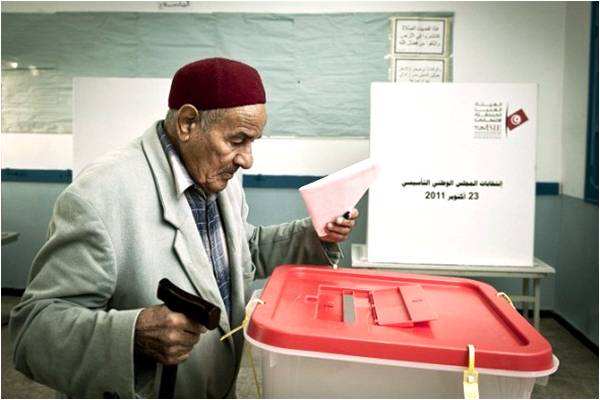
Less than nine months after giving Middle East arguably its most progressive constitution, Tunisia completed its double whammy on Islamism by voting the secular Nidaa Tounes party into power last week. Nidaa Tounes, that won 85 out of the 217 seats in the parliament, can form the government without any coalition with the Islamist Ennahda party that bagged 69 seats. Ennahda ruled the country for two tumultuous years following the Arab Spring, after sweeping the elections in 2011.
Despite Nidaa Tounes riding Beji Caid el Sebsi’s popularity wave, and forming its political spine courtesy personnel associated with Zine el-Abidine Ben Ali’s ancien regime, Tunisian elections have given the Muslim world crucial pointers on democracy. More critically though, with Egypt struggling with both democracy and moderation; Saudi Arabia and Iran being called out for savagery on virtually a daily basis and Turkey slowly but surely succumbing to Recep Tayyip Erdogan’s Islamist plots, Tunisia is presenting a serious case as the leader of the progressive and moderate Muslim world. The contrast in paths taken by Egypt and Tunisia despite following identical tracks and timelines in the aftermath of the Arab Spring, further cements the latter’s stature as the trailblazer for the Middle East and the role model for forward-looking Muslim policymakers around the globe.
The reason why Tunisia’s constitution, ratified in February this year, is the magnum opus of modern Muslim jurisprudence is because it provides solutions to a lot of the problems that the Muslim world is currently facing. The constitution provided the country the ideal bridge between Islamism and secularism. The triumph for Nidaa Tounes is a major shift towards the latter.
Tunisia provides some critical answers for Pakistani politicians and lawmakers in particular. At a time when the Tunisian secularists are celebrating the triumph of moderation, two leading secular parties in Pakistan – MQM and PPP – are involved in a mudslinging matchup over blasphemy accusations, underscoring the history of Pakistani secularists’ flirtation with religious bigotry.

The Tunisian Constitution rid the country of a blasphemy merry-go-round by side-stepping the Ennahda proposed blasphemy clause. Furthermore, it outlawed takfir – the act of declaring individuals or sects as non-Muslims – something that both the Pakistani Constitution and the TTP are equally guilty of. Both the legal and militaristic proponents of blasphemy and takfir have suffocated religious communities in Pakistan, by excommunicating the Ahmadis in 1974 – the reverberations of which are targeting the Shia community – with the TTP doing the same to anyone who doesn’t buy their ideology.
That Islamic jurisprudence has hogged the Pakistani constitution is a major reason why the likes of TTP and LeJ are flourishing in the country. That Tunisia purged itself off Sharia earlier this year is one of the reasons why the country is embracing modern ideals of democracy and universal equality, better than the rest of the Muslim world.
A litmus test of any society’s progression is how it treats its women. Pakistan is languishing at second from bottom in World Economic Forum’s Global Gender Gap rankings, courtesy rape statistics, honour killings, and other manifestations of barefaced discrimination against women. Tunisia, meanwhile, has vied to outlaw women suppression through the Constitution’s Article 45 which “seeks parity between men and women in elected assemblies” and Article 20 that showcases equality in rights and duties of Tunisian men and women.
Even so, while shunning the Sharia law is a statement of intent towards modernity, for a country to be a representative of the Muslim world, it would still need a Muslim identity. This is precisely where Tunisian constitution nailed what every other Muslim country has messed up: finding the ideal blend between Islam and secularism.
It’s impossible for any Muslim country to jump from Shariah law to a pure secular constitution. Tunisia has perfectly demonstrated the inevitable transition.
Islam being the official state religion according to Article 1 of the Tunisian constitution, only has proverbial value especially when Article 6 protects “freedom of conscience and belief” and allegations of blasphemy and takfir have been unequivocally prohibited. Islam’s role in law-making has been reduced to symbolism, with most allusions to the religion having been scribed in ambiguous verbiage to ensure that civil law always supersedes Islamic law when the two inevitably clash. Article 21 is a classic example, which clarifies that inheritance would be decided according to civil law which is based on gender equality.
When one is vying to blend together two mutually antagonistic ideologies, abstruse diction is critical, because secularism and Islamism would be at loggerheads more often than not. Which of the two gets preference defines the quintessence of the constitution. While both Pakistan and Tunisia both emulate 1789’s Declaration of the Rights of Man and of the Citizen, and other constitutional expressions borrowed from the French Revolution, the latter ensures the supremacy of civil law, while the former established and has intermittently reinforced the status quo of Islamic law since 1973.
Tunisia has countered Islamism, not by military intervention, foreign drone strikes, religious apologia or disowning extremists, but through good old egalitarianism. The clout of popular opinion has conquered Islamism in Tunisia, while simultaneously demonstrating the interdependence between democracy and secularism.
If Nidaa Tounes can steer clear of internal conflict and deliver on the governance front as well, Tunisia’s would be the archetypal lesson on progress and moderation for the Muslim world that has been marred by military interventions and religious fanaticism. Tunisia is the hope for democracy and secularism in the Muslim world.
Despite Nidaa Tounes riding Beji Caid el Sebsi’s popularity wave, and forming its political spine courtesy personnel associated with Zine el-Abidine Ben Ali’s ancien regime, Tunisian elections have given the Muslim world crucial pointers on democracy. More critically though, with Egypt struggling with both democracy and moderation; Saudi Arabia and Iran being called out for savagery on virtually a daily basis and Turkey slowly but surely succumbing to Recep Tayyip Erdogan’s Islamist plots, Tunisia is presenting a serious case as the leader of the progressive and moderate Muslim world. The contrast in paths taken by Egypt and Tunisia despite following identical tracks and timelines in the aftermath of the Arab Spring, further cements the latter’s stature as the trailblazer for the Middle East and the role model for forward-looking Muslim policymakers around the globe.
The reason why Tunisia’s constitution, ratified in February this year, is the magnum opus of modern Muslim jurisprudence is because it provides solutions to a lot of the problems that the Muslim world is currently facing. The constitution provided the country the ideal bridge between Islamism and secularism. The triumph for Nidaa Tounes is a major shift towards the latter.
Tunisia provides some critical answers for Pakistani politicians and lawmakers in particular. At a time when the Tunisian secularists are celebrating the triumph of moderation, two leading secular parties in Pakistan – MQM and PPP – are involved in a mudslinging matchup over blasphemy accusations, underscoring the history of Pakistani secularists’ flirtation with religious bigotry.

The Tunisian Constitution rid the country of a blasphemy merry-go-round by side-stepping the Ennahda proposed blasphemy clause
The Tunisian Constitution rid the country of a blasphemy merry-go-round by side-stepping the Ennahda proposed blasphemy clause. Furthermore, it outlawed takfir – the act of declaring individuals or sects as non-Muslims – something that both the Pakistani Constitution and the TTP are equally guilty of. Both the legal and militaristic proponents of blasphemy and takfir have suffocated religious communities in Pakistan, by excommunicating the Ahmadis in 1974 – the reverberations of which are targeting the Shia community – with the TTP doing the same to anyone who doesn’t buy their ideology.
That Islamic jurisprudence has hogged the Pakistani constitution is a major reason why the likes of TTP and LeJ are flourishing in the country. That Tunisia purged itself off Sharia earlier this year is one of the reasons why the country is embracing modern ideals of democracy and universal equality, better than the rest of the Muslim world.
A litmus test of any society’s progression is how it treats its women. Pakistan is languishing at second from bottom in World Economic Forum’s Global Gender Gap rankings, courtesy rape statistics, honour killings, and other manifestations of barefaced discrimination against women. Tunisia, meanwhile, has vied to outlaw women suppression through the Constitution’s Article 45 which “seeks parity between men and women in elected assemblies” and Article 20 that showcases equality in rights and duties of Tunisian men and women.
Even so, while shunning the Sharia law is a statement of intent towards modernity, for a country to be a representative of the Muslim world, it would still need a Muslim identity. This is precisely where Tunisian constitution nailed what every other Muslim country has messed up: finding the ideal blend between Islam and secularism.
It’s impossible for any Muslim country to jump from Shariah law to a pure secular constitution. Tunisia has perfectly demonstrated the inevitable transition.
Islam being the official state religion according to Article 1 of the Tunisian constitution, only has proverbial value especially when Article 6 protects “freedom of conscience and belief” and allegations of blasphemy and takfir have been unequivocally prohibited. Islam’s role in law-making has been reduced to symbolism, with most allusions to the religion having been scribed in ambiguous verbiage to ensure that civil law always supersedes Islamic law when the two inevitably clash. Article 21 is a classic example, which clarifies that inheritance would be decided according to civil law which is based on gender equality.
When one is vying to blend together two mutually antagonistic ideologies, abstruse diction is critical, because secularism and Islamism would be at loggerheads more often than not. Which of the two gets preference defines the quintessence of the constitution. While both Pakistan and Tunisia both emulate 1789’s Declaration of the Rights of Man and of the Citizen, and other constitutional expressions borrowed from the French Revolution, the latter ensures the supremacy of civil law, while the former established and has intermittently reinforced the status quo of Islamic law since 1973.
Tunisia has countered Islamism, not by military intervention, foreign drone strikes, religious apologia or disowning extremists, but through good old egalitarianism. The clout of popular opinion has conquered Islamism in Tunisia, while simultaneously demonstrating the interdependence between democracy and secularism.
If Nidaa Tounes can steer clear of internal conflict and deliver on the governance front as well, Tunisia’s would be the archetypal lesson on progress and moderation for the Muslim world that has been marred by military interventions and religious fanaticism. Tunisia is the hope for democracy and secularism in the Muslim world.

